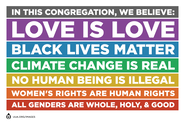This has been an especially difficult and heavy week on the racial justice front: the attempted weaponization of white womanhood against black manhood by Amy Cooper in Central Park, and the latest instance of police brutality resulting in the death of George Floyd in Minneapolis. It’s a hard time to observe how horribly whites can treat people with different skin colors, and, I imagine, for people of color, men and women alike, to witness (again!) the cruelty and trauma visited upon their loved ones and communities. Outrage and grief well up over these injustices and never-ending incidents of systemic evil. The need to lament and to make change follow.
Last night, I sat in on a one-hour webinar organized by our UUA’s Church of the Larger Fellowship, "In the Name of Love: Deepening Anti-Racist Commitment and Values" for white people seeking to dismantle racism in themselves and in society. You can listen to the recording here. After hearing from presenters, participants were asked to go into small break-out groups and share: “Why I am committed to anti-racism and what it means to me.”
I wondered, how is that I actively choose to show up in the world and be anti-racist? How do I move away from saying or believing “I’m not racist!” to living into that proposed Eight Principle -- the one that asks us to “accountably dismantle racism and other oppressions in ourselves and our institutions”??
I rustled around my desk and found the book I’d been meaning to read for some months now… How to Be an Antiracist by Ibram X. Kendi. Here’s a quote the author shared last fall in Yes! Magazine’s conversation with the author:
Kendi: "I’m hoping that people take away from the book, that there’s only racist and antiracist. Most White people would say, “I’m not racist,” and if they’re saying, and they’re swearing that they’re not racist, then chances are they’re being racist. Black people commonly say, “I can’t be racist.” And that’s another sort of form of denial. I do not believe all Black people are being antiracist at all times. And Black people too have created this sort of construction between an antiracist and a racist. And so we too must be striving to be antiracist.”
This seems like a good time to settle in and give it my attention. Do let me know if you’re interested in a book discussion group by Zoom sometime in June!
Here is another opportunity for white allies to meet-up virtually to engage this topic: The “Showing Up for Racial Justice” group hosts A Call to Action for White Folks this Friday evening, May 29th, at 8 pm via ZOOM. Organizers write, “As we mourn the life of George Floyd, we are in solidarity with those in the streets in Minneapolis and the Black liberation movement that is working to destroy white supremacy, abolish the police and free us all. This call will lift up updates from people on the ground and offer concrete actions for people to take.”
Blessings for the journey,
Rev. Cindy
Last night, I sat in on a one-hour webinar organized by our UUA’s Church of the Larger Fellowship, "In the Name of Love: Deepening Anti-Racist Commitment and Values" for white people seeking to dismantle racism in themselves and in society. You can listen to the recording here. After hearing from presenters, participants were asked to go into small break-out groups and share: “Why I am committed to anti-racism and what it means to me.”
I wondered, how is that I actively choose to show up in the world and be anti-racist? How do I move away from saying or believing “I’m not racist!” to living into that proposed Eight Principle -- the one that asks us to “accountably dismantle racism and other oppressions in ourselves and our institutions”??
I rustled around my desk and found the book I’d been meaning to read for some months now… How to Be an Antiracist by Ibram X. Kendi. Here’s a quote the author shared last fall in Yes! Magazine’s conversation with the author:
Kendi: "I’m hoping that people take away from the book, that there’s only racist and antiracist. Most White people would say, “I’m not racist,” and if they’re saying, and they’re swearing that they’re not racist, then chances are they’re being racist. Black people commonly say, “I can’t be racist.” And that’s another sort of form of denial. I do not believe all Black people are being antiracist at all times. And Black people too have created this sort of construction between an antiracist and a racist. And so we too must be striving to be antiracist.”
This seems like a good time to settle in and give it my attention. Do let me know if you’re interested in a book discussion group by Zoom sometime in June!
Here is another opportunity for white allies to meet-up virtually to engage this topic: The “Showing Up for Racial Justice” group hosts A Call to Action for White Folks this Friday evening, May 29th, at 8 pm via ZOOM. Organizers write, “As we mourn the life of George Floyd, we are in solidarity with those in the streets in Minneapolis and the Black liberation movement that is working to destroy white supremacy, abolish the police and free us all. This call will lift up updates from people on the ground and offer concrete actions for people to take.”
Blessings for the journey,
Rev. Cindy

 RSS Feed
RSS Feed


